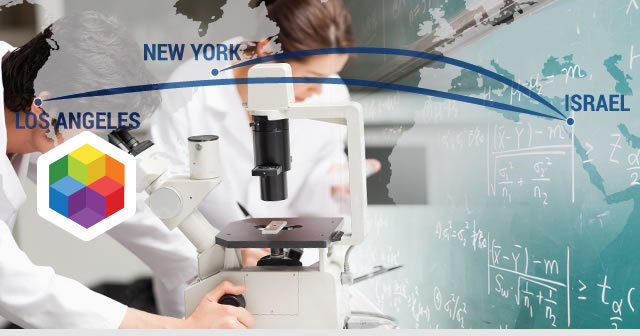
At long last, spring – and with it comes thoughts of renewal, change, and the future. In a harbinger of great things to come, six extraordinary PhD students from the Weizmann Institute’s Feinberg Graduate School came to the U.S. Visiting American Committee regions and addressing supporters in New York City, South Florida, Los Angeles, and the Bay Area, these envoys shared their love of science, explained why they chose Weizmann, and described their impressive research, which is highlighted below. This may be the first time you’ve heard of them… but it won’t be the last.
Elad Bassat in the laboratory of Prof. Eldad Tzahor, Department of Biological Regulation, has a hypothesis: changes in the micro-environment during aging are behind the heart’s inability to heal itself. His work – already producing intriguing results – could have a major impact on the field of cardiac regeneration and may lead to life-saving therapies.
Tom Bielik in the group of Prof. Anat Yarden, Department of Science Teaching, is analyzing how scientific practices are taught and learned in education programs for school-age children. Tom’s results could be significant for science teachers, policy makers, and developers of inquiry-oriented curricula.
Yaara Endevelt-Shapira in the laboratory of Prof. Noam Sobel, Department of Neurobiology, is testing the hypothesis that people with autism spectrum disorder (ASD) are differently tuned to olfactory chemosignals. Her studies could provide insight into a novel aspect of autism, particularly as it relates to difficulties in social situations.
Ella Doron-Mandel in the laboratory of Prof. Mike Fainzilber, Department of Biological Chemistry, is studying the nervous system’s response to injury. She is investigating the mechanisms that induce regeneration, with the hope of also finding the ones that prevent such renewal.
Shay Fleishon in the laboratory of Prof. Uri Pick, Department of Biological Chemistry, is researching algae and photosynthesis. His work, geared toward providing new insights into photosynthesis, could offer new applications in alternative energy.
Shira Weingarten-Gabbay in the laboratory of Prof. Eran Segal, Department of Computer Science and Applied Mathematics and Department of Molecular Cell Biology, has a goal: to reveal the effect of each individual DNA mutation on gene expression as it relates to cancer. Her success could lay the foundation for personalized cancer therapy.
While still earning their doctorates, these six are already doing science that can make the world a better place. This is the norm at the close-knit, hands-on, challenging Feinberg Graduate School. For more than 50 years, it has graduated scientists with the education, experience, and connections necessary for a successful career in academia, medicine, or industry.
This is at least partly due to strategy: the Weizmann Institute provides every single student with a scholarship so that they can devote themselves, fully and without worry, to their education and research. Unsurprisingly, admission is competitive and global; last year, students came from 42 countries besides Israel, with women comprising half the student body. This is where philanthropic support becomes crucial: funding for scholarships is always needed. As a donor, you play a direct and invaluable role in the success of new scientists like the ones introduced here. These graduate students are the future of science – and you can be, too.
